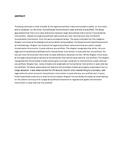| dc.contributor.author | Salim, Seif M | |
| dc.date.accessioned | 2013-04-30T08:10:19Z | |
| dc.date.available | 2013-04-30T08:10:19Z | |
| dc.date.issued | 2004 | |
| dc.identifier.citation | master of Arts in International Studies (2004) | en |
| dc.identifier.uri | http://erepository.uonbi.ac.ke:8080/xmlui/handle/123456789/17935 | |
| dc.description.abstract | This study attempts to look critically at the legal and political instruments used to justify, on one hand, and to constrain, on the other, humanitarian interventions in post cold war era conflicts. The study appreciates that there is no clear dichotomy between legal and political instruments in humanitarian intervention. Indeed the legal and political instruments are inter-twinned and view the field of humanitarian intervention from the same conceptual lenses. The study is divided into five chapters. Chapter one looks at the
background and problem being studied, the objectives and hypothesis as well as methodology. Chapter two looks at the legal and political instruments that are used to justify humanitarian intervention in post cold war era conflicts. This chapter recognizes that while, they are legal as well as political justifications for humanitarian intervention in
post cold war era conflicts, the two are inter-twinned and there exist no clear dichotomy between the two. While Chapter three looks at the legal and political constrains to humanitarian intervention post cold war era conflicts. This chapter recognizes
that the principle of state sovereignty is a major constrain to interventions in post cold war era conflicts. Chapter four, looks critically and analytically at humanitarian intervention in post cold war era conflicts. The study appreciates the idea that the principle of state sovereignty is sacrosanct but no longer absolute. It also observes that the UN Security Council is the nearest thing to universally valid legal authority when comes to humanitarian intervention in post cold war era conflicts, but it rarely finds the political unanimity to enforce the principles. Chapter five concludes the study by emphasizing on the need to come up with a legal and political framework to regulate and guide humanitarian intervention in post cold war era conflicts | en |
| dc.description.sponsorship | University of Nairobi | en |
| dc.language.iso | en | en |
| dc.title | Humanitarian intervention in internal conflicts in the post cold war era: political and legal | en |
| dc.type | Thesis | en |
| local.publisher | Institute of diplomacy and international studies (IDIS), University of Nairobi | en |

